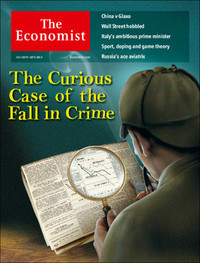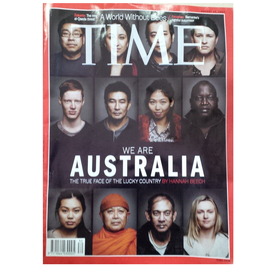

The cover stories of two international magazines in the past month should have given considerable food for thought for Malaysians to ponder as to what has happened to Malaysia, more than 100 days after the recent general elections and which is to celebrate our 56th National Day in eleven day’s time.
The first is the 20th July 2013 edition of The Economist “The Curious Case of the Fall in Crime”, reporting that “The rich world is seeing less and less crime, even in the face of high unemployment and economic stagnation”.
The Economist “briefing” article states:
Across the developed world, the crime wave that began in the 1950s is in broad retreat.
Both police records (which underestimate some types of crime) and surveys of victims (which should not, but are not as regularly available a source of data) show crime against the person and against property falling over the past ten years in most rich countries. In America the fall began around 1991; in Britain it began around 1995, though the murder rate followed only in the mid-2000s. In France, property crime rose until 2001—but it has fallen by a third since. Some crimes are all but disappearing. In 1997, some 400,000 cars were reported stolen in England and Wales: in 2012, just 86,000.Cities have seen the greatest progress. The number of violent crimes has fallen by 32% since 1990 across America as a whole; in the biggest cities, it has fallen by 64%. In New York, the area around Times Square on 42nd Street, where pornographers once mingled with muggers, is now a family oriented tourist trap. On London’s housing estates, children play in concrete corridors once used by heroin addicts to shoot up. In Tallinn you can walk home from the theatre unmolested as late as you like.
While the debate is ongoing as to what is behind this spectacular and widespread improvement in the crime scene in the developed countries, what hit Malaysians in the face 100 days after the 13th General Elections and 11 days before the 56th National Day Celebrations is the worst crime situation in the nation’s history, with Malaysians suffering from the worst “fear of crime” in the country with the easy availability of firearms and the frequency of deadly firearm crimes.
What has gone wrong with Malaysia with the country reduced to such a state of lawlessness?
The second is the Time magazine cover story last week on “WE ARE AUSTRALIA: THE TRUE FACE OF THE LUCKY COUNTRY”.
Is it conceivable that Malaysia could have been the subject of national and international magazines in the past three months as “The True Face of the Lucky Country”?
This is totally inconceivable with the upsurge and escalation of unprecedented language and politics of hate and intolerance revolving particularly around race and religion, trying to negate the conventional belief that the diversity of the people, languages, cultures and religions in Malaysia is the country’s greatest asset rather than its greatest weakness.
More than a hundred days after the 13th general elections, and eleven days to the 56th National Day celebrations, Malaysians must ask when, and what Malaysians must do, for regional and international publications to front-page Malaysia for being a “lucky country” and being “low-crime country”.

Mr Lim,
Now, where did I hear that it is merely our perception that crime is on the rise in Malaysia?
So, given the fantastically unbelievably low rates of crime in Malaysia, it should not be very long before we see Malaysia as “the lucky country” being plastered all over the front pages of every respectable and reputable magazine the world over!!
Yes, those low low low crime rates are, indeed, fantastic and unbelievable, aren’t they?? I do know I can scarcely believe them Heheheheheh!!!
If nothing is done to arrest the deteriorating domestic crime situation, Malaysia will soon be front-paged by regional and international publications for being an “unlucky high crime country”. Didn’t the BBC highlight “Malaysian restaurant hires armed guard” in its world news?
or some underworld business in some developed, industralized, first world country
I don’t hear the Australians calling these citizens ‘pendatangs’ or telling them to ‘balik’ wherever they came from. They are most welcomed there and they are a Lucky Country indeed. Many Malaysians have made Australia their home and have risen to very high levels of society.
In 1Malaysia we have ‘Project IC’ to welcome new citizens too. At the same time we tell some citizens to ‘balik’ wherever you and your ancestors came from.
no more as they don’t even know english
Australia wants the best and the brightest.
Umno wants umno-supporters.
How can crime not increase, as we debate this, a crime is being committed at the very top of UMNO/BN – Shahrizat after the people successfully hounded her out of office for corruption, Najib has the IDIOCTIC GALL to ASK WHY WE ARE SO INTERESTED WHETHER SHAHRIZAT HAS BEEN GIVEN AN APPOINTMENT??
The crime is NAJIB STILL THINK HE IS QUALIFIED TO REMAIN AS CHIEF EXECUTIVE OF THIS COUNTRY after his remark..
she has what they want
The widespread use of CCTVs in developed countries since the early 90s is one of the main reasons why crime rates are falling in these countries. Besides capturing images in a busy street, modern CCTVs can also record down number plates of vehicles and warn young people to stop fighting and pick up rubbish which they threw on the street (if the CCTV is equipped with a loudspeaker). Lim Guan Eng was on the right track when he planned to install more CCTVs in Penang to reduce crime. It is important that images of criminals captured by CCTVs be published in the media (newspapers and Internet) so as to deter others from committing crime.
there are live CCTVs with powerless authority just like nice decorations
This is the price you paid for allowing illegal and cheap labors into the country and deprived our own citizens of their decent wages. Malaysia will have to get worst before it can get any better.
Never.
Ever.
Underestimate the malaysia boleh mentality.
… hoi mana si celaka tu. Where is that 1billion ringgit allocation to lobby the journalist and the chief editor?
We live in a milieu where we could have easily made news in front page of regional and international magazines of being the only remaining country that could reconcile claims to democratic ballot votes with that of (what many in the liberal countries would consider) ethnocentric /fascist cum crony capitalistic policies which side line a lot of people from many sectors. As Nelson Mandela is quoted to have once said, “When a man is denied the right to live the life he believes in, he has no choice but to become an outlaw” especially when he thinks that his stealing to eat ain’t criminal— but the ‘lucky’ others (well connected) stealing to be rich is and is yet protected by the unfair system! All these help give crime an appeal as a thriving and profitable business when other lawful businesses are seen facing hardship in the face of our economy sliding slowly but inexorably downwards due to wrong/misguided policies.
The ruling regime thrives on hate and lawlessness. See how they can get away with practically anything. It is a banana country.
We are actually a lucky country too. We are not troubled by natural disasters like earthquake, typhoon and cyclone and we are richly endowed with natural resources like petroleum and equatorial rain-forest. Our land is so fertile that almost anything can grow on it. Unluckily, our country is not in the hands of capable managers. This time round our deteriorating crime situation has caught the attention of an international magazine. What’s next? Our dangerous roads and unscrupulous drivers?